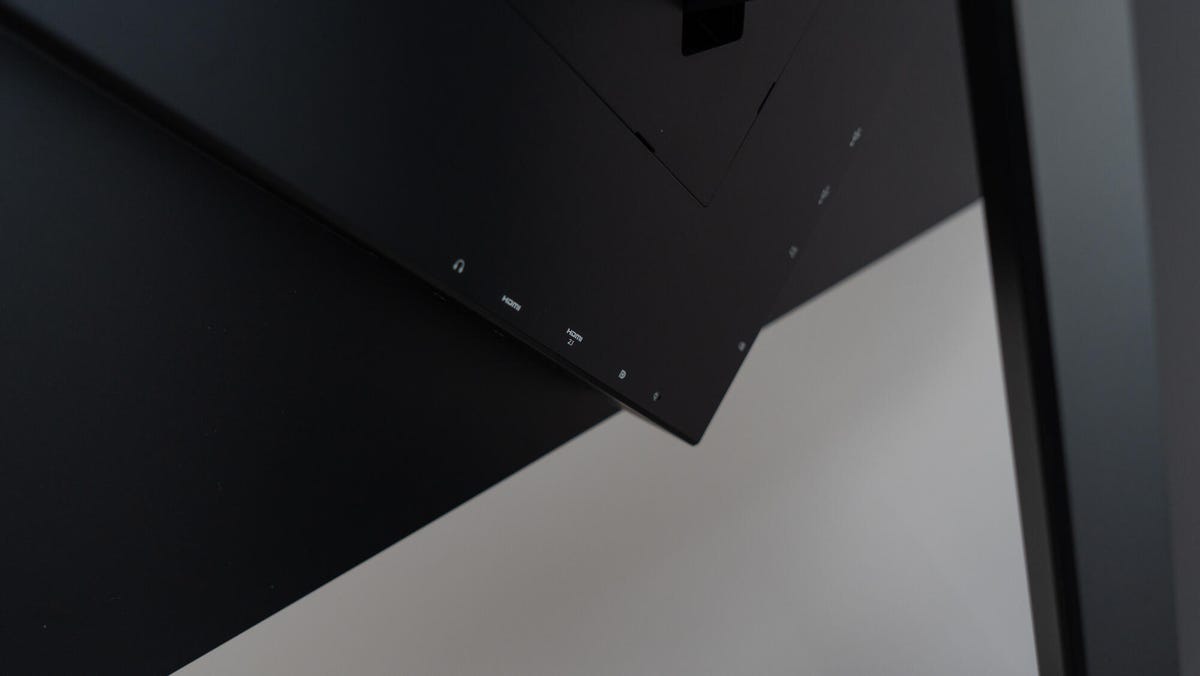There aren’t a ton of gaming monitors in the same class as HP’s Omen 27U. While it’s one of the higher-priced models of its competitive cohort at $700, it stands out from the competition for a variety of reasons. Notably, it has an HDMI 2.1 connection with support for variable refresh and 4K 120Hz when connected to an Xbox Series X or VRR on the PS5 — a feature that’s starting to gain traction for gaming displays. And it comes in a sleek design you don’t usually see in a gaming monitor, even when you light it up, along with a functional layout for the connectors that’s also rare.
The monitor isn’t available internationally, but $700 converts to roughly £570 or AU$1,020.
The monitor is DisplayHDR 400 certified, but that just means it’s brighter than average with possibly a broader color gamut than a typical monitor. Most of the current competitors at this price are the same. But if you’re actually looking for a monitor to use for HDR, look to one with DisplayHDR 600-level specs, like the similarly priced LG Ultragear 27GN950. That model doesn’t support VRR on consoles, so there’s your tradeoff.
The HP also includes built-in stereo speakers, though they’re low power, 2-watt versions that are basically good for system notifications and similarly undemanding audio. It also has a small USB hub with two USB-A connections, but sadly no USB-C out.
HP Omen 27U
| Price | $700 |
|---|---|
| Size (diagonal) | 27 inch (68.5 cm) |
| Panel and backlight | IPS with edgelit backlight |
| Flat or curved | Flat |
| Resolution and pixel density | 3,840×2,160, 163 ppi |
| Aspect ratio | 16:9 |
| Maximum gamut | 95% DCI-P3 |
| Brightness (nits, peak/typical) | 450/450 |
| HDR | DisplayHDR 400 |
| Adaptive sync | FreeSync Premium Pro |
| Max vertical refresh rate at 4K | 144Hz (DisplayPort), 120Hz (HDMI 2.1), 60Hz (HDMI 2.0) |
| Gray-to-gray response time | 1ms |
| Connections | 1x HDMI 2.0, 1x DP 1.4, 1x HDMI 2.0, 2x USB-A 5Gbps (out), 1x USB-C (in) |
| Audio | Headphone jack, 2x 2-watt speakers |
| VESA mountable | Yes, 100×100 mm |
| Panel warranty | 1 year; 2 max bright sub-pixels, 5 max dark subpixels, 5 max combined bright and dark. Image retention damage not covered for monitors in use 24 hours a day. |
| Release date | April 2022 |
I’ve grown quite fond of the 27U’s design since HP debuted the style several years ago. The connections sit on either side of a diamond-shaped section that houses the electronics; that means they’re facing the sides rather than the desk, which makes it easier to get to them. And its high-to-low position ranges over 130mm compared with most monitors’ 110mm range. Plus the stand has a headset hook, if you prefer them unseen when not in use.

The HP Omen 27U at its highest point.
Lori Grunin/CNET
The display behaves as expected when connected to an Xbox Series X, meaning it will automatically sense the connection coming online when you turn on the console and will set the refresh rate to 120Hz.

The HP Omen 27U at its lowest point.
Lori Grunin/CNET
It has the usual set of game-specific features, like a crosshair, framerate display, fudgy shadow boosting and so on. It’s got an MPRT mode to compensate for motion blur, which only works at refresh rates over 100Hz and in SDR. This visibly lowers the brightness as you level it up, as well as multiple speed settings for pixel response, half of which result in bad halos around moving objects.

The connectors face out rather than down, making them easier to access.
Lori Grunin/CNET
There’s a single Game preset, which is essentially the Native mode with lower brightness and the correct tone curve for HDR when it’s enabled. You don’t have any real HDR options: When you turn it on in Windows, or on the console, it’s on. Because of the around-the-edge backlight, it has little control over local contrast — HDR only really looks like HDR when the bright and dark areas next to each other pop. That, combined with the low peak brightness, makes it less HDR and more SDR-plus. That’s sadly true of many “HDR” monitors.
Color measurements
| Default/sRGB | Native/P3 | |
|---|---|---|
| Gamut (% covered; before/after correction) | 97.8/100 | 93.2/93.2 |
| White point (before/after correction) | 7100K/6600K | 7200K/6500K |
| Gamma | 2.06 | 2.1 |
| Brightness (nits) | 242 (typical)/381 (peak) | 434 |
| Accuracy (DE2K average/max after adjustment) | 1.49/2.62 | 1.66/5.09 |
| Contrast (before/after adjustment) | 1,000:1/1,024:1 | 999:1/1,030:1 |
There is also a novel Game Remaster mode, which “automatically applies enhancement filters to lower-resolution games.” I tried it with the original Fallout and couldn’t see any difference. Your mileage may vary, though.
I’d say the monitor delivers pleasing, rather than accurate, colors. HP says the monitor is factory-calibrated, but my measurements had it high across the board by roughly 500 degrees Kelvin, including in the Warm (5,000K) and Cool (9,300K) presets. In other words, graphics were a little cooler and bluer than they should have been. Decreasing the blue gain from 255 to 240 put all the numbers roughly back in line with HP’s claims. If you’re not sensitive to color temperature, though, you probably won’t notice: It’s not that far out of whack. If you want to get the tone curve to a strict 2.2 gamma, you’d have to calibrate the monitor.
“Pleasing” is probably the adjective that most suits the Omen 27U in general. It’s not the bestest in its class, but the great design and console compatibility elevate it above what it might otherwise rate. I don’t know that it’s a good choice for the traditional, hardcore PC gamer, but if you need a display for a small space that looks nice, works well and, oh yes, is good for gaming on a PC as well as console, the 27U ticks all the boxes.
How we test monitors
All measurements are performed using Portrait Displays’ Calman Ultimate 2021 software using a Calibrite ColorChecker Display Plus (formerly X-Rite i1Display Pro Plus). We use a Murideo Six-G pattern generator for HDR testing where necessary, or the Client3 HDR patterns within Calman, where possible. The extent of our testing depends on the capabilities of the monitor, the screen and backlight technology used and the judgment of the reviewer.
On the most basic models, we may stick with just brightness, contrast and color gamut, while on more capable displays we may run tests of most user-selectable modes for gaming or color-critical usage, uniformity and so on. For the color work, we may also run tests to verify how white point accuracy varies with brightness.
Color accuracy results reported in units of Delta E 2000 are based on Calman’s standard Pantone patch set, plus the grayscale and skin tone patches. White points results are based on both the actual white value plus the correlated color temperature for the entire gray scale (21 patches, 0 to 100%) rounded to the nearest 50K as long as there are no big variations. We also use Blur Busters‘ motion tests to judge motion artifacts (such as ghosting) or refresh rate-related problems that can affect gaming.




